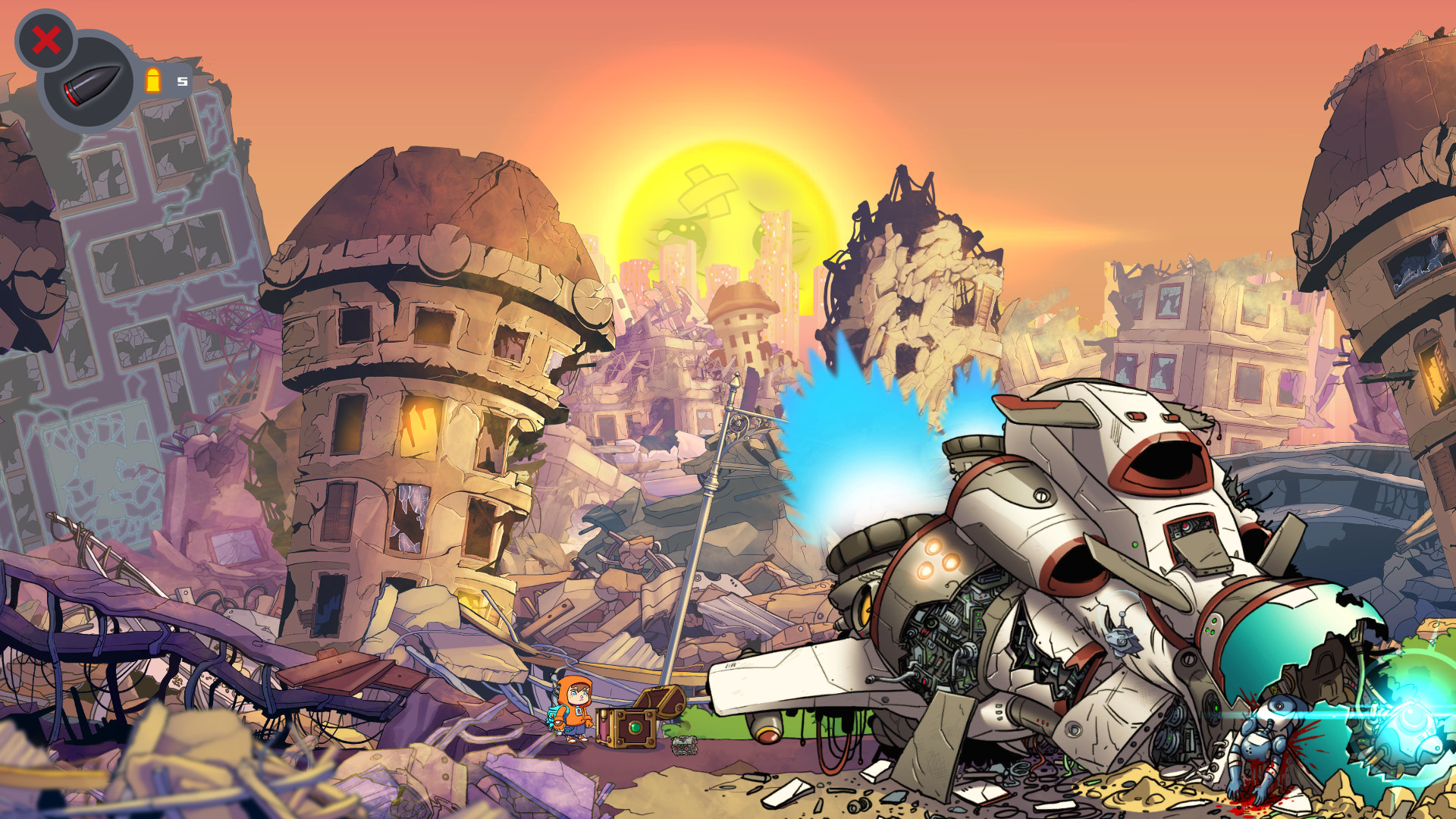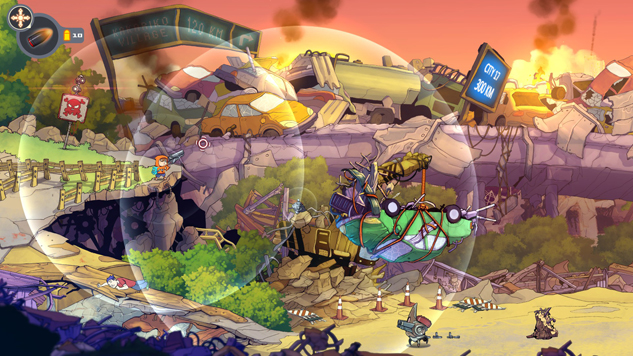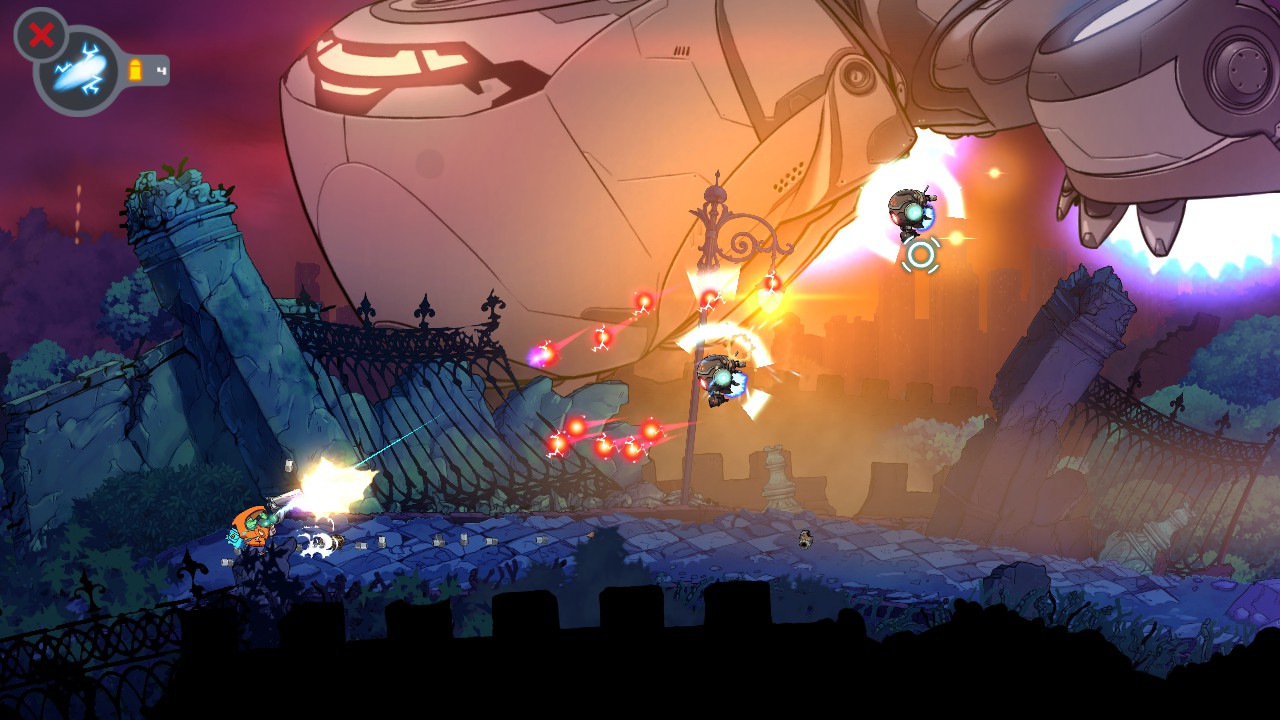There are times when pandering to nostalgia won’t save you from a critic’s harsh words, even when said critic looks back at that time in gaming with a certain fondness.
Rise & Shine looked promising in all of its press releases, but it takes only a moment to see what it lacks in comparison to other games of its genre. Throwbacks are becoming more and more common for the indie circuit, so seeing more games trying to strike gold with it hardly comes as a surprise.
Rise & Shine was developed by Super Awesome Hyper Dimensional Mega Team and published by Adult Swim. It’s a sort of cover-based, side-scrolling shooter puzzler with plenty of callbacks to gaming’s not-so-forgotten past. It makes no bones about its origins, for the game takes place on a planet called Gamearth that’s being invaded by the planet Nextgen. Nextgen is a planet that just so happens to be filled with space marines and a whole bunch of futuristic machines.
Yes, the lack of subtlety is intentional on their part.
You play as a boy named Rise who is given a gun named Shine and goes about the world. You must repel the invasion as you journey to give the magic talking gun to the king of Gamearth.
The story is told in a mix of some comic-styled cut scenes and some with moving parts which, considering the game’s art style, works fine. If there’s a part of this game that is strong, it’s the artwork. It’s nearly impeccable in conveying the type of world you find yourself in — a cartoonishly gory shooter with both comedic and serious moments. With its attention to detail when it comes to the art, one may think that the rest of the game fares similarly, but they’d unfortunately be incorrect.
While tonally, artistically and even sound design-wise Rise & Shine gets high scores across the board, it’s in its gameplay that it falls apart. The shooting itself is fine when you’re just shooting normal bullets at an enemy that’s coming toward you. Unfortunately, this side-scroller added cover-based shooting, and that’s where things get a to be sluggish. There’s no better way to clog a perfectly good side-scroller than cover-based shooting sections, and yet here it is as a main gameplay mechanic.
When facing down one enemy it works just fine, but it’s those swarms of enemy robots where things get tedious. It becomes a matter of shooting fast enough to negate all of their bullets in addition to hitting them, and then darting back behind the cover before you get hit. Rise can only take a few hits and his health regenerates over time, but that decreases the urgency of many of the encounters. Even then, you may still find yourself dying to minor enemy encounters because you haven’t struck the enemy swarms fast enough. It’s one of those times normal side-scrolling would have been better.
 Image Courtesy of Gamespot
Image Courtesy of Gamespot
This leads us to our next problem. When you are just side-scrolling, you’ll find yourself at a woeful disadvantage compared to your enemies. This isn’t to say they’re supposed to be easy — far from it. But if this game is supposed to be taking from these past shooters, then they know that putting the player at too much of a disadvantage can turn the player off the game entirely.
A prime example of this is during certain boss fights. Not only are you expected to do normal side-scroller shooting – which you haven’t been doing much compared to cover based – but you also have to switch between bullets constantly depending on the boss. If it was only the types of bullets then it’d be fine, but it’s also how the bullets control. There’s a remote control bullet system which enables the player to control where their bullets go after they fire the gun. It’s cool system in theory, but it in many ways it fails in execution.
There are also puzzle sequences which are meant to break up the gameplay — and they do, but they also add to the frustration of navigating your tiny bullet through a bunch of hazards to only hit a single button. It can be fun, but it can also become tedious if you just happen to time things poorly. The magnetic auras that radiate from the devices that allow you to control your bullets fade in and out, which means you have to time when you’re able to navigate the entire area without it going back toward the device.
After a while you’d think you’d get the hang of it, but while your skill controlling it may improve, you’ll never know the exact timings of everything without intensive trial and error. Of course, that bring the whole experience to a screeching stop.
Image Courtesy of: Games Wisdom
Rise & Shine acts as though it’s a side-scrolling shooter, but only succeeds in doing so when it sticks to that script and doesn’t go off the tonal deep end into cover-based shoot. These, sudden shifts end up breaking the follow with unnecessary gameplay elements that detract from what could be a decent game. Add in the fact that the controlled bullet segments are actually part of the boss fights, and it leaves sections the game feeling far more frustrating than they should be.
This is the sort of game where you expect to have fun and lose yourself in the playful, tongue-in-cheek atmosphere. Unfortunately, there are many features/mechanics that don’t fit in with the rest of the game. And it doesn’t help that while you’re doing these odd parts, they control sluggishly and grind your experience to a halt.
There’s a delay in almost everything you do when you’re not just running sideways, and even during boss fights you may find yourself completing certain actions a few seconds too late because you’re used to moving much slower. It doesn’t help matters that these bosses just happen to have moves that will instantly kill you in one hit if you don’t jump through all of the hoops the game wants you to.
Rise & Shine is a missed opportunity that plays decently enough, but fails to realize just what made games of the past succeed as much as they did.
Note: A copy of this was provided by for review.


 I
I





Published: Jan 25, 2017 06:50 am